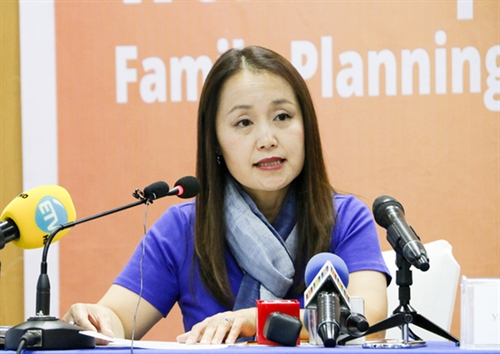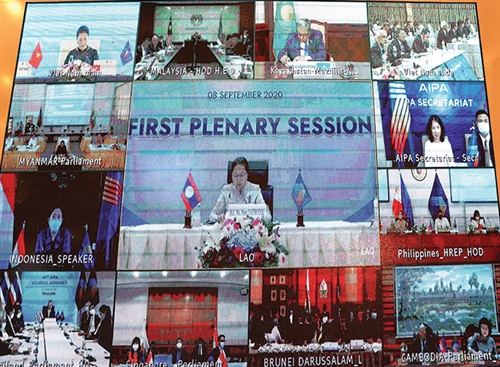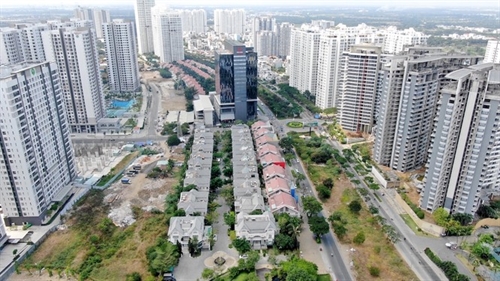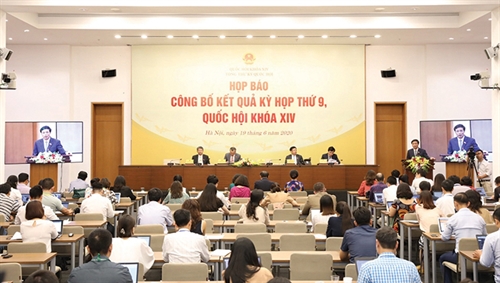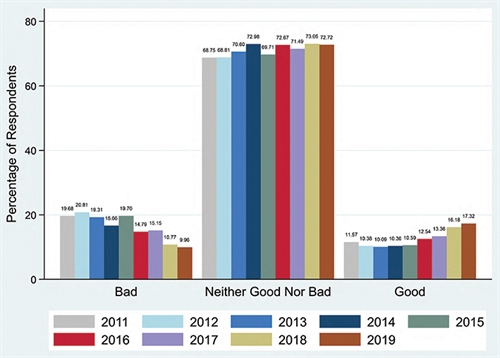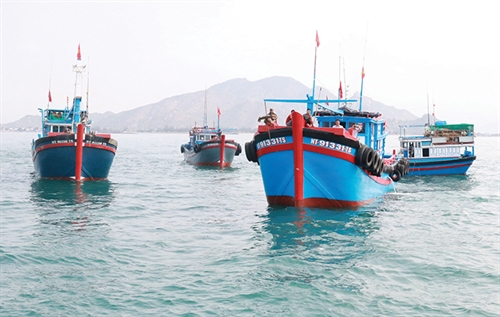The 10th sitting of the National Assembly (NA) opened on October 20 in Hanoi was expected to proceed via video conferencing till October 27 and to gather for face-to-face discussions during the plenary session from November 2 to 17.
During the seven days reserved for lawmaking activities, NA deputies will vote to adopt seven laws and three resolutions, NA Chairwoman Nguyen Thi Kim Ngan said at the opening session.
The to-be-passed laws include the revised Law on Vietnamese Guest Workers; Law on the Vietnam Border Guards; Law on International Agreements; revised Law on Environmental Protection; Law revising a number of articles of the Law on Handling of Administrative Violations; revised Law on Residence; and Law amending a number of articles of the Law on HIV/AIDS Prevention and Control.
The three resolutions to be adopted are those concerning Vietnam’s participation in the United Nations’ peacekeeping forces; organization of urban administration in Ho Chi Minh City; and pilot management and use of land reserved for national defense and security purposes for production and economic activities.
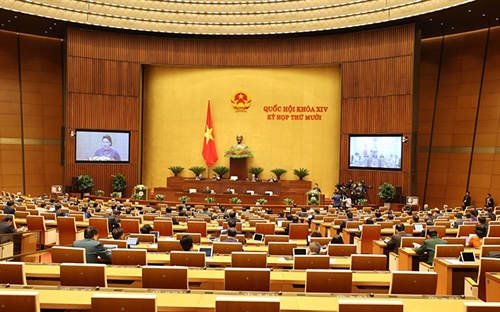 |
| The 10th session of the 14th National Assembly opens in Hanoi on October 20__Photo: VNA |
At the session, legislators are expected to give opinions on four bills that aim to better guarantee human rights and civil rights, uphold national security and public order as well as meet socio-economic development needs. They include the draft laws on amendments to the Law on Road Traffic; amendments to the Law on Drug Prevention and Control; assurance of road traffic order and safety; and forces participating in protection of security and order at the grassroots.
The Legislature will examine reports and give questions on the implementation of NA resolutions on specialized oversight activities and questioning during the current 14th tenure and a number of resolutions adopted in the 13th tenure, as well as reports on which public opinions have been collected.
The Parliament will also decide on the date of election of deputies to the 15th NA and People’s Councils at all levels for the 2021-26 term.
Residence management to be conducted electronically
Debating the revised Law on Residence, most NA deputies agreed on the need to replace the method of residence management through household registration book and temporary residence certificate with the computerized method of residence management.
They also agreed with the Government’s proposal that the revised Law on Residence would take effect on July 1 next year.
However, many lawmakers said the Law should have provisions to ensure the readiness of state agencies to serve and not to cause troubles for residents.
They suggested household registration books and temporary residence certificates continue to be used until the end of 2022, for competent agencies to get information about places of residence of the people.
The parliamentarians said the shift to a new method of residence management was urgent and should be implemented from the time the law takes effect, but pending the full establishment of connections of ministries, agencies and localities with the National Database on Population and Database on Residence, people still need certain papers to verify their places of residence.
They said permission for the continued use of these papers would help prevent causing difficulties for the people while easing the pressure on management agencies when the law becomes effective.
Tran Thi Dung, a NA deputy from the northern province of Dien Bien, said the use of citizen identification to update information to the National Database on Population was a progressive trend and a goal many countries in the world aim for.
However, she said, it required careful considerations because household registration and residence books were related to the people’s daily life and activities of agencies and organizations.
According to the Government’s plan, the connection and sharing of information and databases among all ministries, sectors and localities would not have been completed by 2025, Dung said, adding that it was impossible to ensure efficiency of the national database by July 1 next year.
Nguyen Thi Lan, a NA deputy from Hanoi, said the revised law would simplify procedures and paperwork in residence management work by abolishing part or all of the 13 groups of administrative procedures relating to permanent and temporary residence registration.
The change would be helpful to the people and relevant to the trend of administrative reform, she said.
Lan expressed her concern that it may be too late if the replacement was only implemented by December 31, 2022.
“The country will not be able to keep up with international integration and Industry 4.0 as well as its economic development,” she said.
She proposed the Government and the Ministry of Public Security to review human and physical resources to determine the appropriate timing to ensure the feasibility of the law.
Meanwhile, Minister of Public Security To Lam said the abolishment of household registration books was the people’s desire.
“Changing management methods would bring change and excitement for the people,” he said.
Lam said over 90 percent of the national database’s data has so far been collected, verified and put into the system with a target that management methods related to household registration books and citizen identification will be deployed by July 1 next year.
He said the law should have provisions on the transition period before it comes into force, adding that the drafting committee had a roadmap and determination to implement the law shortly.
Controversial opinions on power cut-off as an administrative sanction
Discussing the draft revised Law on Handling of Administrative Violations, NA deputies’ opinions were divergent on penalty relating to cutting off electricity and water supply as a sanction imposed on violators.
Some NA deputies proposed not including the sanction in the law because a review showed difficulties in its enforcement.
Electricity and water are essential for individuals and organizations, so if this sanction is applied, it will have a negative impact not only on the law-breaking individuals and organizations but also on others.
According to Ma Thi Thuy, a NA deputy from Tuyen Quang province, the application of this sanction will lead to a violation of human rights and sanctioning principles.
The supply of electricity and water is carried out under civil contracts signed between service users and providers. “This coercive measure does not show humanity and is not convincing, while it is infeasible. It is also contrary to the principle of self-agreement and self-responsibility specified in the Civil Code,” Thuy said.
However, many others voiced support for the sanction, saying it was necessary. They believed the measure would be effective in forcing individuals and organizations to abide by the law.
However, they said the scope of application should be narrowed so that it would not affect other individuals or organizations.
NA deputy To Van Tam from Kon Tum province pointed out that administrative sanctions must be strictly executed.
Currently, there are some coercive measures which, however, are not strict enough in certain areas.
Therefore, coercive measures such as cutting off electricity and water were essential, Tam said, adding that it should be done with caution and only in certain areas.
He suggested that the measure should be imposed in the areas of construction and environmental protection and with certain conditions.
Tam said he was still concerned about feasibility of the measure because it might exert an impact on people who are not involved in the incident.
“The measure should be associated with the responsibility of the electricity and water service providers to ensure feasibility,” Tam said.
Necessity of renewal of the urban administration model in Ho Chi Minh City
Presenting the report verifying the draft resolution on organization of the urban administration in Ho Chi Minh City, Chairman of the NA Committee for Legal Affairs Hoang Thanh Tung said his Committee advocated the adoption of the resolution in order to concretize the provisions of the 2019 Law revising a number of articles of the Law on Organization of the Government and the Law on Organization of Local Administration, thus facilitating the City’s development.
He said the Committee proposed the resolution should come into force on January 1, 2021, so as to organize the urban administration in the City from July 1 the same year.
According to the Committee, the renewal of the urban administration model in Ho Chi Minh City is important and urgent and expected to promote economic growth and general development of the City.
The resolution would serve as a necessary legal ground for the City to immediately apply this model from the upcoming tenure, Tung said.
Once the resolution is adopted, it is proposed that the Government should, after three years of its implementation (until 2023), review and evaluate implementation results. At the same time, together with outcomes of the pilot organization of the urban administration model in Hanoi and Da Nang, the Government needs to propose improvement of urban administration models if deeming it necessary and propose the NA to revise the Law on Organization of Local Administration or promulgate a law on organization of urban administration for application to all urban centers, ensuring its legal validity, effect and consistency with the legal system.
However, Tung said the draft resolution fails to set out practical solutions relating to the organization and operation of the People’s Council of Ho Chi Minh City in the context that the City does not organize People’s Councils in all of its districts and wards. He asked the Government to include in the draft resolution specific provisions on renewal of the organization and operation of the municipal People’s Council for raising its operation effectiveness and efficiency and better performing its function as a representative of the people as well as controlling powers of administrations of districts and wards.
Tung’s Committee also asked for revised provisions on the competence of the municipal People’s Council to decide on state budget funds and the assignment for the municipal People’s Committee to decide on some public investment-related issues to ensure consistency of the resolution with the Law on Public Investment.
In addition, some members of the Committee proposed reviewing the provisions on tasks and powers of chairpersons of People’s Committees of districts in deciding on investment policy for programs and projects of group B and group C that are funded by budgets of the districts or their wards or in approving medium-term and annual public investment plans or socio-economic development plans by People’s Committees of wards.- (VLLF)
